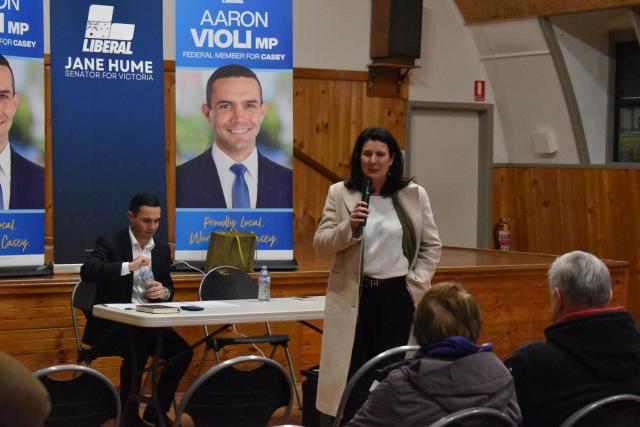
By Callum Ludwig
Casey MP Aaron Violi was joined by Liberal Senator and Shadow Minister for Finance Jane Hume in the Casey electorate gauging how the cost of living is affecting the community on Thursday 13 July.
Ms Hume is the Chair of the Australian Parliament’s Select Committee on the Cost of Living, with she and other committee members spending time travelling around Australia to help inform their report, which is set to be finalised sometime from November after the interim report was released in May.
After speaking to representatives from local businesses and organisations throughout the day, residents also had the chance to share their views at a forum in the Wandin North Public Hall.
Ms Hume said the cost of living is the number one issue for almost all Australians and it’s affecting them in different ways, whether it’s labour costs, energy costs or housing affordability.
“It’s the secondary effects too, charities are telling us that they can’t find volunteers or that they can’t keep the lights on in their op shop and businesses are telling us it’s not just a cost of living crisis, it’s a cost of doing business crisis,” she said.
“People aren’t really interested in the big-picture economic solution, they want to know how you’re going to solve their particular problems and as soon as possible,”
“Most of the time when a committee does inquiries and hearings, it does so with things like peak bodies, big businesses or government departments, we’ve decided to do this differently because it’s their lives, their livelihoods, their jobs, their families, their relationships, their mental health.”
Mr Violi and Ms Hume started off the forum by giving an overview of what is driving up the cost of living; identifying the high levels of aggregate demand in the country as Australia exited the Covid-19 pandemic, external factors such as the Russian invasion of Ukraine and it’s impact on global trade and a rise in input costs and raw materials as some of the key factors.
Attendee Tom Burns said he thought the forum would be a little bit less about reports coming out and more about what action is being taken.
“I wanted to hear more about their strategy to change things locally, that was a lesson on economics. People just want to know what they are doing about our energy costs,” he said.
“We find that we’re not poor people, but we keep the power off now because we just don’t know what the bill will be when we get it.”
Energy costs immediately became a focus of the attendees when they did crop up in the discussion; Mr Violi brought up the Coalition’s push for more nuclear power in Australia, as evidenced by Opposition Leader Peter Dutton’s address to the Institute of Public Affairs on Friday 7 July, the Coalition voting against a price cap on gas as it may disincentivise investors and limit supply and the shutting down of coal plants without suitable replacements.
18 coal-fired power stations remain in Australia, with all of them expected to close within the next according to the Australian Energy Market Operator (AEMO). In the Australian Government’s Resources and Energy Major Projects Report for the 12 months leading up to October 2022, coal projects consisted of 9.1 per cent of Australia’s committed resource and energy projects (third most), with oil and gas projects the most committed to with 51 per cent.
Some of the forum’s attendees were worried about the potential financial impact of Australia’s goal of net zero emissions by 2050. One attendee asked Ms Hume to define the net zero goal for them and Ms Hume replied that it is “bringing emissions down to a net zero, because we can’t reduce them to completely zero”.
A couple of audience members weren’t happy with the response, believing it “didn’t answer the question” to which Ms Hume replied that she “is not the energy minister”. A combination of Mr Violi and an audience member’s Google search were required to settle the disgruntled room.
Mr Violi said there’s not one silver bullet to solve the problem and politicians don’t pretend that there is.
“We need to work together on a bipartisan level to find solutions to some of these challenges where we can,” he said.
“Behind every economic number that we talk about are humans and people that are really feeling it every day.”
A group of local businesswomen and women representing families also met with Mr Violi and Ms Hume over lunch.
Co-owner of Hatrick and Co Lisa Glassborow said the best thing that came from their meeting was that by bringing a group of people together who are in the same situation, they felt a sense of relief and connection that they weren’t in this alone.
“Senator Hume was asking questions of us and we were then able to ask questions of her and just share our first-hand experiences and our stories, which was great,” she said.
“It was a great example of democracy in action and working well and for me, it’s vital that they are doing this. I think the more stories and the more people they hear from across different landscapes, the richer the information is going to be.”







